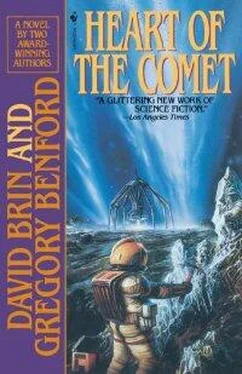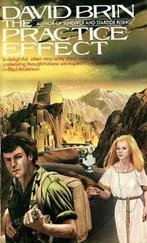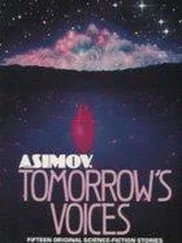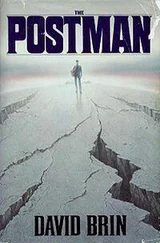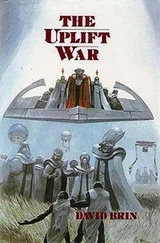“Um, don’t pay any attention, Jeff. It’s just JonVon acting up again. As soon as we’ve finished with this project I’m going to give him a good memory purging.”
—Sounds like he’s picked up a bit of your hand for scribbling. If he’s been writin’ poems for thirty years, you may be in for some competition, child.—
Jeffers sounded amused, and Virginia laughed. But within she was beginning to get worried. Something was wrong with her bio-organic computer counterpart. In some skills JonVon seemed more subtle, more capable than when she had been slotted, decades ago—a natural result of programming him for slow, steady self-improvement. But in other ways the machine/program now behaved erratically, uncertainly, spontaneously giving forth these bursts that seemed irrelevant, untraceable.
Trash-strewn snowfields stretched away toward the row of agro domes around the entrance to Shaft 1. Huge mirrors hung from spidery ice towers nearby, concentrating the sun’s distant spark to turn the domes into bright blazes against the grainy ice.
Beneath the glassy domes, green masses waved gently under artificial breezes. A few workers drifted languidly among the plants, tending the colony’s staff of life. Since awakening from slot sleep, she had had little time to learn about the hydroponics procedures that had been developed, by trial and error over the long decades. But she could tell already that the process could use a lot of automating.
Her mechs arrived where Jeffers’s spacesuited figure awaited her, standing beside a toppled crystal structure. Broken shards of glassy ice were everywhere.
Virginia gasped. “This is terrible! Who wrecked Jim Vidor’s sculpture?”
The statue had been dedicated to Captain Cruz and the dream so many members of the expedition had shared. It had depicted a spacesuited figure, ragged and weary but perseverant, holding out sparkling gifts on his return to a blue globe, the Earth.
Virginia remembered how proud Jim Vidor had been of it, just before his slotting so long ago. It had been a beautiful work, crafted in six shades of ice, traced in native crystal. But now the carved spacer lay crumpled on its side, and the blue planet was crushed.
Deep under the surface, in her lab, Virginia tensed on her webbing as she looked at the vandalism through the mech’s eyes. “Who…?”
Jeffers’s voice was tense. —Dunno. I’d guess some of Sergeov’s Ubers did it.—
“But why?”
The spacer shrugged. —Cruz was an Ortho.—
That seemed explanation enough to him. Virginia felt her skin flush, just then ashamed to be a Percell.
“Has Jim ever seen this?”
—Naw. Matsudo brought him out in 2073 or so, and Lintz’s cyanutes fixed his first disease. But then they had to slot him again a year or so later with a real bad blood infection. I guess in a way it’s a blessing, at that. He’ll never see how bad it’s all gotten since then. Jim was an Ortho. But I liked him a lot.—
“Yeah,” she said, unable to think of anything else to say. She stepped her mechs around the shattered moment to join Jeffers. Come on Let’s see if we can work a miracle or two.”
—Right, pretty Hawaiian lady.—Jeffers reached up and pulled several narrow envelopes off a rack carried by one of the mechs. —This way to the Elephants’ Graveyard.—
They rounded a rocky hummock and Virginia sighed. No mere statistics could have prepared her for the scene before her now. Machines, laid out row upon row, in orderly ranks that stretched nearly to the curved horizon, all frozen, unmoving, locked in a rigor of uselessness and disrepair.
“Where do we start ?” she asked in dismay.
Jeffers clapped his gloved hands together and lifted off the ice a couple of meters in his nervous excitement.
—Who cares! For three years I’ve been pokin’ way at the hardware, fussin’ in the autofactory, scragging prototype spares. But I keep hittin’ software glitches, ROM blocs, clapes I just couldn’t grok! Frustrated everythin’ I tried.—
He landed facing her mech.
—But now , in just two weeks, you’ve sorted out things that had me dead stopped!—
Her mech lifted a metal hand, exactly mimicking Virginia’s gesture down within her darkened lab. “Now hold on, Jeff. I said this was just a first cut. No promises…”
But the man had already jetted over to a spindly repair-bot… a sophisticated androidlike machine designed for the maintenance of other devices, but now frozen itself in a locked rigor of uselessness.
—Let’s start with this puppy. I already did a physical workover on it.—
Virginia watched nervously as the spacer sorted through the envelopes, selected one, tore it open, and drew forth a gleaming sliver. He pried open an access panel and slipped the reprogramming crystal into the back of the machine.
—Arise!—he commanded, stepping back with a theatrical wave of his arms.
Virginia held her breath. For an instant, it seemed that the frost coating the rigid mech would bind it into immobility. A part of her wondered, Can a statue come to life?
But then the frost cracked, puffing away in tiny, silent explosions as amorphous ice changed state directly into gas. With a wavering delicacy, the machine unfolded. In an unlimbering of stiltlike, mantis legs, it stood up and turned to face Jeffers. Eye cells gleaming, it extended a long arm strong enough to snap the man in two. A many-fingered hand opened, like a blooming flower.
Jeffers laid the stack of envelopes into the sure, deft grasp.
—The Armies of the Dead arise this mornin’!—He laughed. —Come on, angel face. We got some heavy-duty resurrectin’ to do!—
Virginia forgave the man his marginal blasphemy. His excitement was infectious. Almost as much as the deadly illnesses and the manpower shortage, this gradual decline in the colony’s mech force had contributed to the pervasive mood of hopelessness, the impossibility of achieving anything real.
Oh, it won’t make enough of a difference, whatever we accomplish out here. Nothing can replace missing human beings.
But we just may be able to make life a bit easier around here.
Jeffers was a dervish on the ice, hurrying from drone to roboid to waldo mech. Virginia thought she had no illusions; still, she grew amazed and more hopeful as they moved along the silent rows of the graveyard, swapping program slivers, lubricating, energizing.
It was thrilling to watch. Long-dead machines, frozen rigid for years, shuddered and stood up. Others rolled by on grapple wheels, or floated free of their moorings. Data channels clicked, beeped, twittered with well-ordered computer code.
Their efforts began to multiply as reprogrammed repair-bots moved out on their own, taking over whole rows of disabled mechs. What had been a small cluster of activity spread outward like ripples from a spring-thawed pool.
As dust drifted away from long-quiescent machines, their headphones carried sounds of wonder and growing excitement from the agro domes. Crowds began to gather, staring out at what had heretofore been a silent, frozen army. Airlocks opened, and spacesuited figures spilled onto the snow to stare at the milling mechanical crowd.
Jeffers cried out as a huge lifter mech puffed away on a burst of ionized hydrogen to hover nearby, its green and blue lights glittering. Shadows spread past them as it moved over to moor beside the long-unused supply depot.
The headphone-channel monitors cut in to dampen an overload of cheering from the onlookers.
More and more people appeared on the ice, in spacesuits not used in years, wearing once-white tabards now ratty from age. Some threw away caution and leaped in excitement, to arc high overhead for tong minutes while others jeered happily.
Читать дальше
